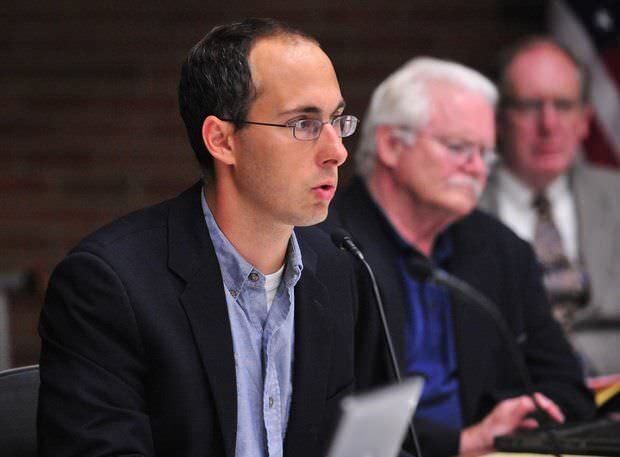
City Council Member Chuck Warpehoski, D-5th Ward, convinced his colleagues to support a resolution Tuesday night declaring Ann Arbor a compassionate community. (File photo | The Ann Arbor News)
City Council officially declares Ann Arbor a Compassionate Community
In many ways, Ann Arbor already is a compassionate community that cares about the less fortunate and the disenfranchised.
But now the City Council has officially declared that Ann Arbor is a compassionate community.
The council voted unanimously Tuesday night in favor of a resolution affirming the goals of the so-called Charter for Compassion, part of a global movement to create a world where everyone is committed to living by the principle of compassion.
"We recognize that, while we have shown our desire to create a community where there is hope and promise for all of our citizens though support of such things as affordable housing/housing equity analyses, expansion of public transit resources and financial support for human services, some of our neighbors continue to experience poverty, hunger, homelessness, racial bias and other debilitating problems," the council's resolution states.
"We believe that we can become more effective in dealing with these issues by intentionally creating a community-wide context of compassion, as described in the attached 'Charter For Compassion,' calling for meaningful activation of fair, just and caring principles relating to public policies and private actions on the part of all people while recognizing their religious, ideological, social and national differences."
Council Member Chuck Warpehoski, who brought the proposal to council, said supporting the goals of the Charter for Compassion is an affirmation of the city's values. He said it doesn't require any allocation of city resources at this time.
Some council members were initially hesitant to support the resolution, some raising concerns that there seemed to be religious undertones.
"Compassion impels us to work tirelessly to alleviate the suffering of our fellow creatures, to dethrone ourselves from the centre of our world and put another there, and to honour the inviolable sanctity of every single human being, treating everybody, without exception, with absolute justice, equity and respect," the charter reads in part.
In an attempt to make the proposed resolution more palatable, Warpehoski removed a clause that stated the city would be open to working with other regional units of government and nongovernmental groups toward the development and implementation of a program for action to pursue the charter's goals.
Council Member Jack Eaton, D-4th Ward, said he was struggling to understand how life would be any different in Ann Arbor if the resolution was adopted.
Warpehoski acknowledged it's mostly symbolic, though he believes it will put a little more wind in the sails of community members working on a local initiative to implement the Charter for Compassion in Washtenaw County.
Council Member Sumi Kailasapathy, D-1st Ward, pointed out the Interfaith Council for Peace and Justice, Warpehoski's employer, is behind the initiative.
The proposal Warpehoski brought to council states that ICPJ will take the lead in forming a coalition of nongovernmental community activists to undertake various tasks, keeping the local government informed about their progress and maintaining an open invitation for government participation as deemed desirable.
Warpehoski assured his colleagues he has no hidden agenda and he doesn't stand to gain anything financially from the passage of the resolution.
The proposal for the initiative calls for following the golden rule — treat others as you would wish to be treated.
"Homelessness is only one community issue that could be impacted by an intentional application of the 'golden rule,' " the proposal states. "Others include conflict management and resolution in law enforcement, the judicial system and schools, and a variety of policy issues that result in economic and racial disparities."
The eight-page document continues, "County and city governing bodies in our area have a history of supporting direct budget funding of human service agencies, have allocated significant additional funding to support expanded affordable housing and are putting into place an updated plan to reduce homelessness and expand public transportation services in underserved areas. This proposal speaks to ways we might be able to build on these positive signs of compassion already in place."
Council Member Stephen Kunselman, D-3rd Ward, pushed for referring the resolution to the city's Housing and Human Services Advisory Board. He said it didn't seem very humble for the city to publicly declare itself a compassionate community.
Kailasapathy also said she hoped the proposal could go through the advisory board and come back to council in a more meaningful way.
She said she wasn't interested in the city having just another symbolic emblem, like how it calls itself a Tree City USA community. She said she hears from people who think Ann Arbor officials are hypocrites for saying that.
There already are a number community activists and religious leaders working on the local implementation of the Charter for Compassion. The initiative has been in the planning and development stage since August 2014.
They're planning educational events between now and January, including a workshop on strategies for enabling compassion in organizations, followed by a day-long social justice conference in February. Additional steps are expected in 2016 and 2017.
In addition to local governmental units, other organizations expected to be involved in the initiative are the Ann Arbor Center for Mindfulness, MISSION, ACLU, Friends of Restorative Justice, American Friends Service Committee, Growing Together Task Force, Religious Action for Affordable Housing, the University of Michigan's Ross School of Business, and the Interfaith Council for Peace and Justice.
"We understand that this initiative will require techniques to help produce changes in hearts and minds to enable people to consider new solutions to known issues such as homelessness, conflict management in public schools, and the interplay among wages and poverty among the working poor in the community," the proposal states.
Ryan Stanton covers the city beat for The Ann Arbor News.
